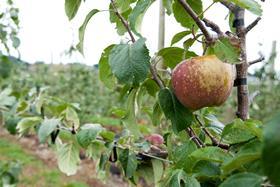
A species of wasp from Kazakhstan has been introduced in Hawke’s Bay, New Zealand, under a plan overseen by New Zealand-based science company Plant and Food Research.
The wasps are intended to protect the region’s orchards from one of the pipfruit industry's biggest threats, the codling moth.
The decision to release the wasps means that New Zealand can keep its record of producing apples with the lowest levels of chemicals worldwide.
It marks the culmination of four years of research on the Mastrus Wasp project by Plant and Food Research, during which time the wasp was intensively tested against other insects and plants to ensure it did not attack any of New Zealand’s other fauna and flora.
While controlling the moth costs the pipfruit industry an estimated NZ$10m annually, it is vital to maintaining access to key export markets as countries without the moth will not import if there is any risk of contamination.
In 2006, the discovery of a single moth larvae in an apple shipment resulted in Taiwan closing its borders to apple exports, costing the pipfruit industry approximately NZ$35m.
If the wasps survive and perform well in the Hawke’s Bay region, they will be released in all apple and pear growing regions in New Zealand.
New Zealand Plant and Food researcher John Charles is positive about the benefits this will have for home gardens as well as commercial orchards.






No comments yet